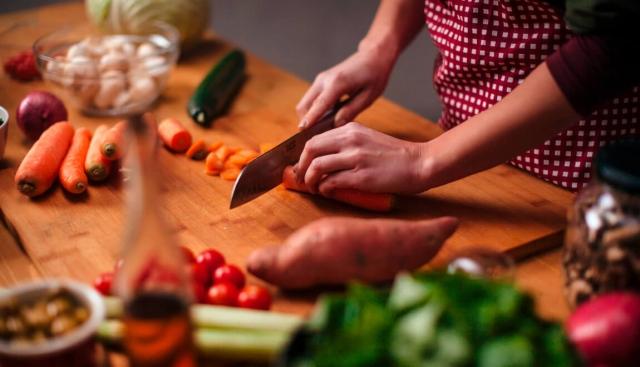Making food at home saves you money and is often better for your health. Cutting down on pizza deliveries and prepackaged, frozen dinners sounds great, but who has the time?
While it’s true that making your own meals at home and the nightly cleanup that follows can be time-consuming, the benefits to your health and your wallet may have you considering tying on that apron and giving your inner chef free reign. Luckily, there are ways to make your time in the kitchen more efficient. Just follow this recipe for saving time, money, and energy in the kitchen.
Take Advantage of the Freezer
Investing in an apartment-size freezer can help you make the most of bulk buying opportunities, as well as store leftovers and meals prepared in advance. Doing this not only saves you money because it allows you to purchase larger amounts of ingredients (often at lower prices), but you'll also save time by being able to prepare meals quickly from prepped and frozen foods.
Speaking of food prep, try cooking your dinners for the week on the weekend and freezing individual portions. If you dedicate Sunday afternoon to cooking, you’ll be able to enjoy home-cooked meals all week long without having to cook when you get home from work. If you choose to do this, stock up on kitchen essentials like airtight food storage containers that are microwave safe.
Get a Slow Cooker
Slow cookers can be a huge help in the kitchen. With little effort on your part, they can turn seasonal produce or discounted cuts of meat into homemade, nutrient-dense meals. Slow cookers are energy-efficient, using less electricity than an oven. And, unlike the oven, the slow cooker won’t heat up your apartment, making it a great appliance to use even during the summer.
Clean as You Go
This is especially important in a small kitchen with limited counter space. When you finish cutting or slicing vegetables or fruit, clean the area and any utensils or cutting boards you used. Sterilize your knives after cutting meat and wash prep bowls after using. If you have a dishwasher, place any items you’re done using directly into the dishwasher. This way, after dinner, you can finish loading and start the cycle, making after-dinner cleanup a breeze.
Keep Track of Your Pantry Items
Knowing what ingredients you already have on hand can save you money at the grocery store by avoiding redundant purchases. Make a list of your pantry staples and check what you have in stock and what may be running low before heading to the grocery store. By doing this, you won’t have to stop halfway through your meal prep to make a mad dash to the grocery store for that bag of flour you didn’t realize was gone.
Shop with a Plan
Planning your meals ahead of time can help to reduce food waste, eliminate impulse purchases, and make sure that you have all the grocery items you need to prepare ahead. And don’t forget to make a list – buying only what you need will help to save money in the long run.
Gather Ingredients Before Cooking
There are several reasons to assemble all your ingredients before you start cooking. First, you won’t be caught halfway through a dish, only to realize you’re missing a key ingredient. It also gives you a chance to read through your recipe. If you’ve ever been in the middle of cooking something, only to realize you should have completed a crucial step sooner, you know why reading the whole recipe before you start cooking can save your dinner from disaster. Having everything assembled ahead of time may take a minute or two, but it will save you valuable time during the cooking process (no more burning your spaghetti sauce while searching for basil).
Even though cooking at home takes time, it is easier on your wallet and is often a healthier (and fresher) option than take-out, fast food, or frozen meals. With a little bit of planning, you’ll be chopping and dicing your way to lower food bills and fresh, home-cooked meals. Bon appétit!






